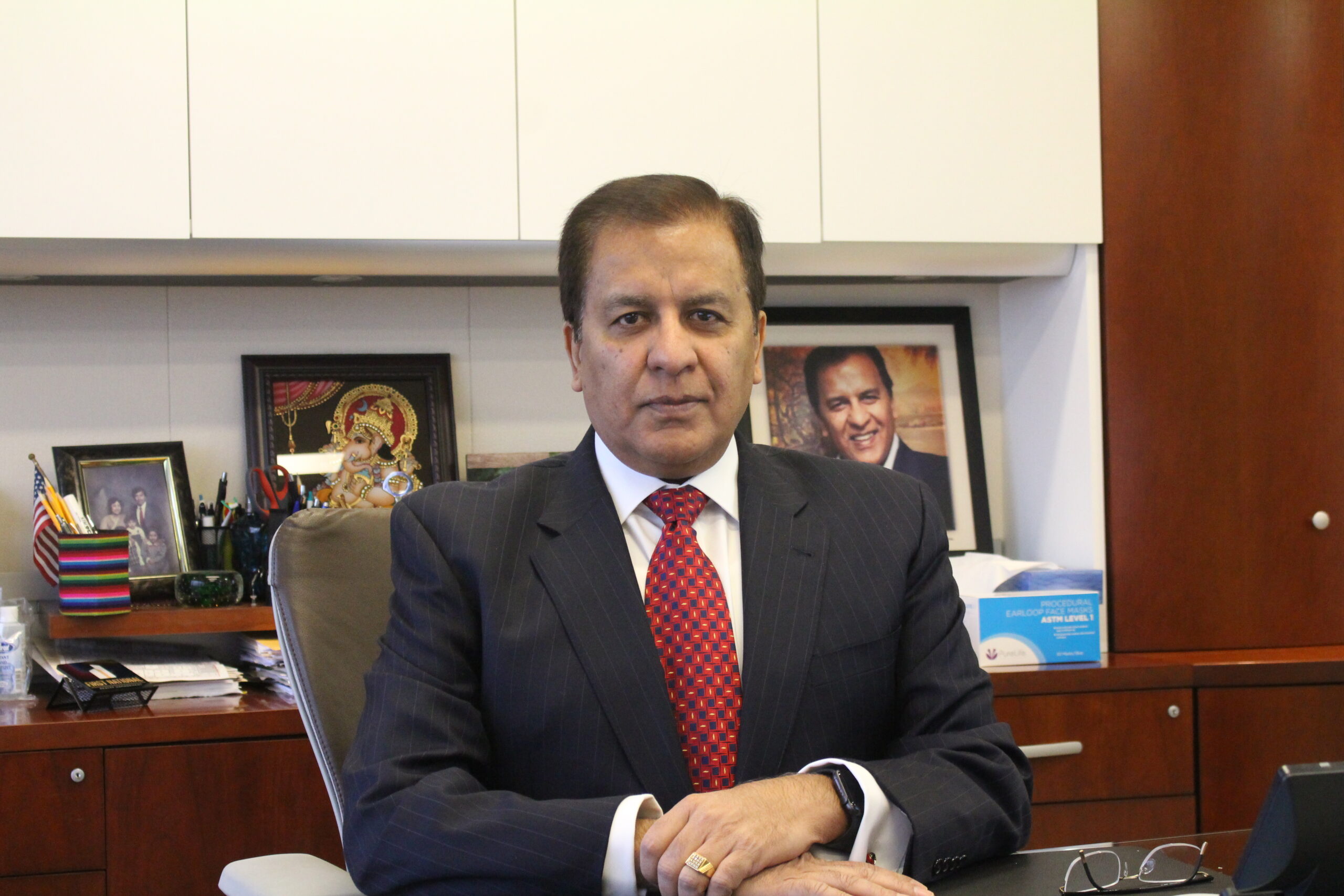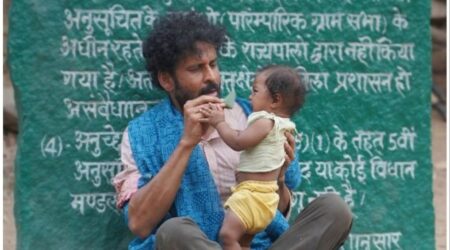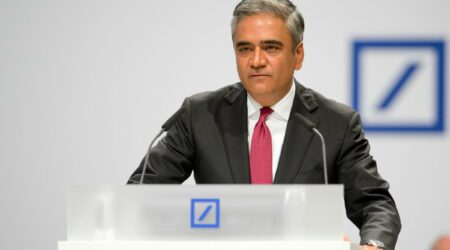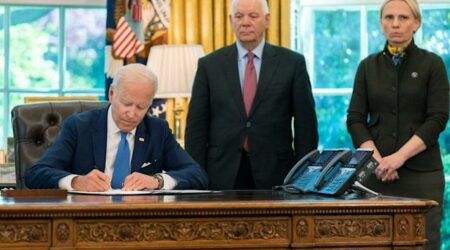by Parveen Chopra
Founding Editor, The South Asian Times
Founder: ALotusInTheMud.com
Not for nothing is Anil Bansal called a serial investor/entrepreneur. With a masters in material science from Notre Dame, he went from an Apple computer distributor to starting software companies to banking and real estate.
A humanitarian at heart, he has been quietly doing philanthropic work all along. Most recently he gave a big donation to a medical school being set up by his alma mater, IIT Kanpur. He received plaudits aplenty when he helmed FIA as President for two terms during the Covid years. He is also on the board of Indo-American Arts Council. We interviewed him a fortnight ago in his office in a building he owns in Lyndhurst, NJ. He avowedly chose to base himself there because it is close to New York City where he loves to go for lunches and dinners.
Excerpts from the interview:
The South Asian Times: You talk about your father influencing you…
Anil Bansal: Yes, I asked my father one day, are we rich or poor? My father said if your hand is like this (palm downward), you are rich and if your hand is palm up it doesn’t matter how much you have, you’re poor. And I think that influenced me all through my life that I always wanted to be the giving hand. My father, Jag Mohan Bansal, was from Mathura and my mother, Lila Wati, was born in Ballabgarh in Haryana
For success, luck is there, but hard work is always needed. Having observed my father and grandfather, I never shied away from working hard. Actually, what I am proud of is, I’ve been independent in making enough money to take care of myself since the age of 12. Even as a child I would buy wholesale firecrackers and Holi colors and then sell them on the street to other kids and make money and have enough for me to play with. And after school, for a couple of hours, I used to go to my father’s shop in the wholesale electric goods market in Bhagirath Palace, Chandni Chowk in Delhi. Once there was a circus in town and somebody from there came in looking for hundreds of fluorescent lamps. I took them to my father’s shop, got them at a good price and made money as commission.

You believe going to IIT was a transformative experience.
Anil Bansal: I was a brilliant student in school (Hindi medium Jain School in Daryaganj), but I never thought I would get into IIT. Then I heard some talk and said, I’m going to take the admission test. I didn’t even tell my family. But when I got selected my name was in the papers. I went to IIT Kanpur in 1972 and that transformed me, once a street kid. At IIT, even if you didn’t believe it, every day you heard that you were among the smartest kids in the country. You start believing that too and your confidence level goes up and your respect for society goes up. At IIT there were Doon School- Xavier types and sometimes when they’ll try to bully you, you say to yourself, okay, I must have been so much smarter than you that despite studying in an ordinary Hindi medium school I got in.
Besides a full scholarship I used to do some work for a professor. So, I used to have extra cash. I was always lavish, taking care of other kids, doing things and striking great friendships.
Around this time IITs started getting a good image outside India also when IITians started moving to the US from the late 1960s. Later, the popular ‘60 Minutes’ news program did a segment that the US imports brain power from a place called IIT. And Bill Clinton said something positive about IIT. So, our secret was out in the public.
You easily got into a US university for masters.
Anil Bansal: For masters I applied to 10 universities in the US for scholarship, and I got nine. By this time universities had a very positive and strong image of IITs and students from it. By now of course, IITians from my generation are deans and heading universities and corporations,
I chose to go to the University of Notre Dame in Indiana and did material science.
Anything remarkable about your time at Notre Dame?
Anil Bansal: I was already married (in 1977) to Kumud before moving to Indiana. At Notre Dame, a small town, we made great friends. There were only about 20 Indians there. So, we had a very close-knit group who became lifelong friends.
I had a scholarship, but now with wife Kumud to take care of, we had to look for the cheapest place possible. So, we lived on a street with primarily African American residents. That again influenced me. Because people on that street were so helpful. At that time, we didn’t know about racism in this country.
What happened after you graduated from Notre Dame?
Anil Bansal: I had many offers but chose to take an offer from Westinghouse in Bloomfield, NJ. The idea was, in New Jersey we could stay with my sister-in-law and save some money.
For a while I worked for a retail store, Computer Pros, selling Apple computers. I took the company from negative to substantially positive, but the owner reneged on a deal to make me a partner in his company. It was a blessing in disguise. I went to the Apple outlets manager and secured a dealership from Apple. That was 1989 when I started my first company, Essex Computers, from Newark, NJ. Then having to move office, I ended up buying a 20,000 sq ft building in Clifton. To utilize the extra space, I built a desktop publishing training center, and it took off very well. Bantam Books, Conde Nast, Bergen Record, New York Times and such big companies sent their people to get trained in software like PageMaker. Soon we were making a million plus dollars in revenue from training and also became the largest supplier of Apple computers anywhere. We also got a big contract from the New Jersey school system to service their computers.

How did you move to real estate?
Anil Bansal: When we started touching 30 million in revenue, my accountant/mentor suggested I leverage that and buy real estate. I have already bought my first building. For the next ten years I bought one building every year – commercial real estate/office buildings. In those days, typically, you put 20% down and 80% you got as a loan from the bank. From the rent, you pay the mortgage. I hired the husband of one of my salespersons to run the real estate side. The real estate gave me the network later on to start many businesses. I was a workaholic. I never slept more than four hours.
Then, in 2001, we learnt that our youngest daughter, Anka, had blood cancer. That was a life changing moment. I decided not to expand anymore. I already had businesses in India. We just decided that we’ll be with her. For a year and a half, both me and my wife were with her. She passed away in late 2002.
You are called a serial entrepreneur, tell us about some of your other ventures.
Anil Bansal: I even dabbled in the restaurant business, starting Mantra in Paramus, NJ, only to sell it later. I also got involved in a company called vSplash TechLabs, which in 2011 started BuzzBoard, an intelligence and analytics platform for SMB companies. I am still their chairman. We have over 300 employees in Hyderabad, India, and about 12 here.
I also helped launch a few companies in India and then gave them to the respective persons running them. Because after Anka passed away, I decided to cut down on my quarter yearly visits to India. Son Avin and daughter Neha were away at college, and I didn’t want to leave my wife alone.
Starting a bank is another thing altogether.
Anil Bansal: What happened was, we had a chance to get a presentation to invest in a Vietnamese bank. That set us thinking, why can’t we start our own bank to help the Indian community. The main force behind the Indus American Bank was me, Deepak Khana and Sharad Wagle. I was the Chairman. From our first branch in Edison, NJ, we kept expanding and had 5 branches. Then the 2008 fiasco hit, and we got burned, more than other banks, because most of our growth was in 2006-08 and the loans we took were at the highest peak. We sold it to BCB Bank in 2015.
Tell us about First National.
Anil Bansal: We have 10 buildings in New Jersey. Our own office is in this building we own in Lyndhurst where I sit. I own 100% of First National Realty Management LLC. Legally, you create a management company which then manages all the buildings.
What is your management style, your HR style?
Anil Bansal: I have always focused on what they do best rather than worrying about what they do wrong. Secondly, I insist on providing them with all the tools necessary to do their job. Three, I always promote happiness. “You need coffee? You don’t like this, you’ll get that.” We say, lunch is on us: you can order what you want… pizza, steak. Often, I take people for an outing … One World Observatory one day, the Statue of Liberty another.
Kumud ji says your father told you that to be happy, you need your surroundings to be happy too.
Anil Bansal: I truly believe in that. You cannot be happy in a sad environment. So, in order for you to be happy, you create people around you who are happy. If they have sadness, you try to fix it, you bring happiness. And no discrimination, please. At home you try to make the happiest environment and at work too you make the happiest environment. There’s no yelling, no fighting, never.
Now extend that principle to the community. As you know I’ve always been very lucky to be able to make more money than I need to live on. So, we’ve tried to give whatever we can to various causes – charities for the needy, children, women. I also support temples and gurdwaras because I find that those are incredibly powerful institutions where people go to get support.
You mentioned to me that you have retired. What does that mean – you are still sitting here in your office?
Anil Bansal: Retired means I don’t worry about making money. I do not do any activity because I need to make money there. Real estate I run in the sense that I’m here just to have an office. But I spend time doing mainly nonprofit work. As you know we have given money to the IIT Kanpur Foundation for a medical school. There’s thus always meetings and communications.
But yes, I am shrinking my portfolio. Now, 10 are left from the 14 buildings we had. My hope is, in another 15 years, if not earlier, I’ll be totally free.
Yet, we have a decent sized stocks portfolio. Yeah, we have enough to live on at the peak.
What advice can you give to young Indian Americans on how to be successful and happy?
Anil Bansal: There is no shortcut to hard work, and it has to be done consistently. A lot of people work hard for a short time and then quit when not getting results. You should do your work and not worry about results because they will come. Then, many of my very smart friends come to me, they have done all the analysis and want to make sure that they’ve covered everything. You can never cover everything! Therefore, if you have a conviction, you have to learn from Nike to ‘Just Do It!’ And I think I’m an example of that. Also, I have never kept any negative feelings about anybody. There have been a few people who may have knowingly hurt me for whatever reasons. But I thank them. Because at every stage of the game something good comes out of it. When you are angry at someone, just remember you’re just brewing the acid inside and it burns you while the eventual goal of every action we do is to gain happiness or avoid pain.
How has Indian upbringing, heritage, and values helped you in your journey?
Anil Bansal: Humility, respect for others, helping others. You don’t have to be independent. In fact, love grows when you are dependent. I’m very dependent on my wife, and she is dependent on me. Take India, US and Canada, they are so dependent on each other. Can you ever imagine a war between them? Contrarily, you’ve seen how during Covid many nations, especially the rich nations, had more, but they wanted to have more, so they hoarded it. We Indians are raised being told that the world is one and you should treat everybody like family. And I think India has proved it.











